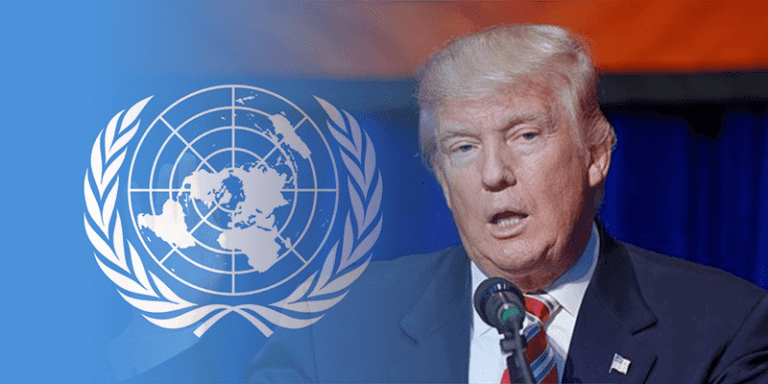
With the Palestinian leadership’s refusal to succumb to Washington’s political blackmail and accept President Donald Trump’s still unannounced plan for Israeli-Palestinian peace, the Trump Administration has threatened to roll back the American contribution to the United Nations Relief and Works Agency for Palestine Refugees in the Near East (UNRWA). This is the pivotal organization that, since its inception in December 1949, has catered to the humanitarian, educational, development, emergency, and health needs of Palestinian refugees. US Ambassador to the United Nations Nikki Haley threatened “to withhold funding for [the] UN agency” until the Palestinians “join the peace process.” The threat quickly became a reality as the US administration, traditionally the largest donor to UNRWA, began to withhold its contributions. UN Secretary General António Guterres warned of potential cuts to vital “health care, education and social services” as a result of the US action.
UNRWA provides services for about five million registered Palestinian refugees in Lebanon, Syria, Jordan, the Gaza Strip, and the West Bank, including East Jerusalem. Currently, Lebanon hosts 450,000 refugees, Syria 438,000, Jordan 2.2 million, Gaza 1.3 million, and the West Bank 810,000. The agency’s 2017 budget was $1.21 billion, with the United States as the largest governmental contributor of $364 million. But the January 2018 cut in American support threw the agency into a financial crisis. Today, the Trump Administration appears to have adopted the Israeli discourse on disbanding UNRWA, which claims that the agency perpetuates the Palestinian refugee situation and that not all those it serves are actually refugees.
The cuts to UNRWA’s funding will have profound effects on the countries that host Palestinian refugees. In that vein, Arab Center Washington DC fellows have submitted commentaries regarding these countries. These analysts attempt to reply to the following question: How would the disbanding of UNRWA and its institutions impact the host countries of Palestinian refugees? Additionally, while UNRWA does not serve refugees in the Arab Gulf, the Gulf states would feel the impact directly since they are likely to make up any deficit in the American contribution to the agency’s budget.
The West Bank and Gaza Strip – Yousef Munayyer
The prospect of UNRWA’s possible dissolution would be devastating to the West Bank and Gaza. In the West Bank, UNRWA serves nearly 800,000 refugees and 19 refugee camps, 96 schools, and 43 health centers. The registered refugee population makes up over 40 percent of the Palestinian population of Gaza and the West Bank, including East Jerusalem. If this support were to disappear, addressing the needs of the population would ultimately fall to Israel and the Palestinian Authority, the former having no desire to serve them and the latter having no capacity to do so.
In the Gaza Strip, the situation is similar if not more stark. There are some 1.3 million registered refugees there, nearly 70 percent of the total population of Gaza. With eight refugee camps, 267 schools, and 21 health centers, UNRWA provides essential services to a massive segment of those already struggling in the besieged Gaza Strip. UNRWA also operates 12 food distribution centers for nearly one million beneficiaries in Gaza. Simply put, the absence of these services would be nothing short of catastrophic as they have been a main component of keeping life in Gaza barely viable.
While the humanitarian dimensions of such an outcome are severe and unconscionable, the political ramifications, though secondary, are significant. Neither the Fatah-dominated Palestinian Authority in the West Bank nor the Hamas-run government in Gaza can fill the gap left by the potential dissolution of UNRWA. This may lead to the collapse of both entities, though not the parties or movements behind them. Who then would fill the gap and take responsibility for the populations there?
Under international law, Israel is ultimately responsible for the population; but it may well attempt to exploit the crisis that would be created as an opportunity to push the West Bank and Gaza populations off to Jordan and Egypt, respectively. Washington and its allies in the Gulf who have great economic leverage over both Egypt and Jordan may try to push for this as well. This is not likely to work without causing an even greater political crisis. At a minimum, however, it would radically shift key institutions the Oslo process developed. Israel would probably welcome such an outcome, one that would allow for more time and excuses to avoid making peace.
Jordan – Tamara Kharroub
There are 2.1 million Palestinian refugees in Jordan who are registered with UNRWA; they constitute 20 percent of Jordan’s total population. The agency has been transferring funds to Jordan to cover education for hundreds of thousands of students, healthcare for hundreds of thousands of patients, and services to 10 official and three unofficial camps sheltering hundreds of thousands of refugees. Losing the funding will lead to a devastating humanitarian disaster for the Jordanian government. The country’s already ailing economy will suffer, affecting the delicate balance of security and stability there.
Politically, Jordan might soon be confronting a crisis in terms of the domestic response to the king’s reaction to US pressures, in addition to impending demographic and political rights issues. Although the majority of Palestinian refugees in Jordan (96 percent of those living outside the camps, and 85 percent of those living in camps) hold Jordanian citizenship, their refugee status is determined by internationally recognized rights and thus Jordan could not be considered their new home.
Israel and members of the Trump Administration have been pushing a false claim that only registered Palestinian refugees pass refugee status to their descendants. However, other refugees in similar protracted situations around the world pass their refugee status to their children and grandchildren. In fact, according to the UN’s High Commissioner for Refugees, dependents “are normally granted refugee status according to the principle of family unity.”
Reports in the last few weeks have revealed that presidential advisor Jared Kushner wants to cancel the refugee status of Palestinians and urged Jordan’s King Abdullah to resettle Palestinian refugees permanently. In response, Jordan has vowed to organize a conference on the sidelines of the UN General Assembly on September 24, 2018 to raise funds for UNRWA, but the kingdom has little leverage. Jordan relies heavily on US aid—$1.5 billion annually—and is therefore unable to confront the US-Israeli agenda without broader international support that includes Europe and Arab countries.
Lebanon – Joe Macaron
Lebanon is one of the countries immediately impacted by the Trump Administration’s decision to cut UNRWA funding. Palestinian refugees in Lebanon do not enjoy rights typically given to non-Lebanese residents nor do they have access to the job market. The US decision takes away their basic services and aid with no alternative in sight, hence increasing their arduous plight and the likelihood of social unrest inside the Palestinian camps. Cutting UNRWA funding could also exacerbate the divisions between Palestinian factions in Lebanon and potentially undermine ongoing reconciliation efforts.
The Lebanese government, which is currently in a caretaker mode, has offered no official reaction yet except for two statements condemning the US decision by Parliament Speaker Nabih Berri and Foreign Minister Gebran Bassil, who expressed concerns about a US plan to settle Palestinian refugees in Lebanon. Unlike their differences on returning the Syrian refugees to their home country, Lebanese officials agree on the dangerous implications of cutting UNRWA funding and have previously made it clear that the Lebanese government will not replace UNRWA, given the country’s economic crisis. The hope in Lebanon is that European and Arab countries would pitch in and make up some of UNRWA’s lost revenue.
There are political sensitivities surrounding this issue, and these might subdue Lebanon’s official reaction. In December 2017, the Lebanese government oversaw the first ever census for Palestinian refugees and estimated the number at 174,000; for its part, UNRWA puts the number at 450,000. Last March, Bassil asked UNRWA to unregister Palestinian refugees who stay outside Lebanon or acquire citizenship from another country, arguing this would reduce the financial burden of the agency.
So far, Lebanon has remained neutral. It had been excluded from the implications of the Trump Administration’s so-called peace plan between the Israelis and the Palestinians. The American decision on UNRWA could potentially change that, however. The US attempt to strip Palestinian refugees in Lebanon of their status will not have a strong impact on their daily lives inside the camps, but cutting UNRWA funding would clearly worsen an already difficult situation.
Syria – Imad Harb
Palestinian refugees in Syria fare no better than Syrians who were internally displaced by war or fled the country since 2011. According to UNRWA, of the Palestinian refugees living in Syria at the beginning of the civil war, over 120,000 fled, about 50,000 of them to Lebanon and Jordan. Currently, 254,000 of the Palestinian refugees in Syria are internally displaced persons (IDPs)––essentially refugees a second time––because of military operations in or near their neighborhoods. Ninety-five percent need sustained humanitarian assistance while 52 percent are unemployed. In 2017, the United States provided 60 percent of UNRWA’s emergency funding in Syria.
It is thus clear that disbanding UNRWA, or cutting American funding to the agency, would make the lives of Palestinian refugees in Syria even more intolerable. What also makes the situation more dire is that the Syrian regime is unable to address the deficit since it is currently faced with its own problems of IDPs and refugees. Nonetheless, the plight of Palestinians in Syria will seriously impact Syrian politics, the economy, and the social system.
While the Palestinians in Syria, by and large, have avoided getting involved in the civil war, some joined Islamist organizations fighting the regime. Indeed, cutting UNRWA funding may lead to more radicalization among Palestinian youth, which would add security risks after the end of the war. Not a stranger to repression, the regime would have no qualms about suppressing Palestinian dissent. It may even resort to expelling troublemakers across the Lebanese border. Economically, Palestinians may find themselves in the underground economy since they are bound to face discrimination for not having supported the government during the Syrian conflict. Finally, they are likely to become more socially isolated, poorer, and lacking in educational services and medical care, both of which historically have been provided by UNRWA.
The Arab Gulf States – Khalil E. Jahshan
The decision to bankrupt UNRWA will have a broad and deep impact on regional politics, one that extends way beyond the borders of historic Palestine. GCC member states are not immune to these repercussions. Indeed, they will be directly affected in political and economic terms. Politically, Washington depends on GCC endorsement of its plans, which are not popular in the Arabian Gulf. The results of ACW’s latest Arab Opinion Index show a huge gap in these countries between public policy and public opinion regarding Palestine. Further pressure by the Trump Administration will most likely widen the gap between the rulers and their constituents and raise internal opposition to public identification with US policy objectives in Palestine.
Economically, the Trump Administration does not hide its condescending attitude toward its Gulf allies; it treats them like a cash cow that could replace US financial commitments in the region, including cuts to UNRWA. The White House knows that UNRWA will seek to replace the $200-300 million withheld by Washington with emergency donations from the Gulf. That would be in addition to the annual share of UNRWA’s budget these states have already committed and the $650 million expected from Qatar and fellow GCC members for Gaza’s development. In other words, Trump and his aides continue to act based on a faulty assumption that the GCC allies will and should pay the bill for Washington’s folly.





